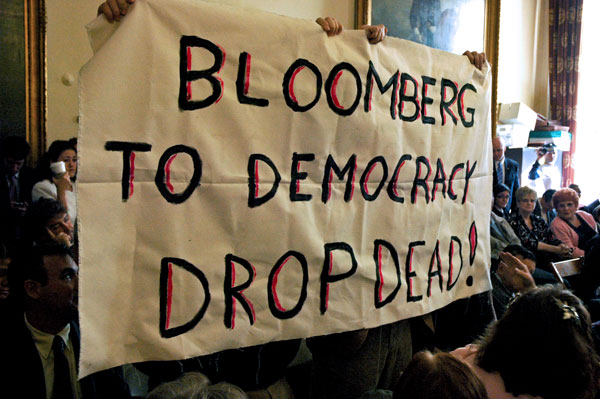
INDEPENDENT VOTERS
- Specter won’t rule out run as an Independent (By Aaron Blake, The Hill) The decision would be harder for Specter, too, because Pennsylvania state law does not allow someone who has lost a primary to run as an Independent, as Lieberman did. Specter would need to decide to run without a party in advance of the primaries.
- Specter Wants An Open Primary (Steve Rankin, Free Citizen)
- If a voter wants to switch (News Observer - NC) "We've become pretty liberal in allowing unaffiliated voters to vote in either primary already," he said. "Why shouldn't the rest of us get to?"l
NATIONAL POPULAR VOTE
- Will state be ignored? Bill would give candidate with most national votes our electoral votes (Peter Marcus, Denver Daily News)
- Colorado House approves plan that would elect president by popular vote (Seattle Times)
OBAMA ADMINISTRATION
The Centrist President (Ben Domenech, the New Ledger) His White House has already become an engine of Rahm Emanuel-approved partisan political attacks, fueling targeted media campaigns against Rush Limbaugh, Jim Cramer, Rick Santelli and others.
NEW YORK POLITICS
- Bloomberg's third-term-rigging: Not so fast, folks.... (Newsday/Spin Cycle)
- Democrats gain first-ever enrollment edge upstate (By Robert J. McCarthy, Buffalo News) Unaffiliated gains more
- Extension of Term Limits Clears a Key Legal Hurdle (By FERNANDA SANTOS, NY Times) “We are obviously disappointed,” said Randy M. Mastro, the lawyer who represented the opponents, including Councilwoman Letitia James of Brooklyn and some minority Council candidates. “But our fight continues.”
4 comments:
Hello, Hankster.
The picture you use on this story is mine, and it appears on a post I did about activists interrupting a New York City Council hearing on Bloombeg's term limits coup.
I don't need the exposure myself, but I'm sure the dedicated people who worked so hard to organize the intervention, and your own curious independent readers as well, would welcome a link to the original story.
I would appreciate it if you would link to this post:
http://jameswagner.com/2008/10/its_not_about_term_l.html
Thanks, guys.
The major shortcoming of the current system of electing the President is that presidential candidates concentrate their attention on a handful of closely divided "battleground" states. 98% of the 2008 campaign events involving a presidential or vice-presidential candidate occurred in just 15 closely divided "battleground" states. Over half (57%) of the events were in just four states (Ohio, Florida, Pennsylvania and Virginia). Similarly, 98% of ad spending took place in these 15 "battleground" states. Similarly, in 2004, candidates concentrated over two-thirds of their money and campaign visits in five states and over 99% of their money in 16 states.
Two-thirds of the states and people have been merely spectators to the presidential elections. Candidates have no reason to poll, visit, advertise, organize, campaign, or worry about the voter concerns in states where they are safely ahead or hopelessly behind. The reason for this is the winner-take-all rule enacted by 48 states, under which all of a state's electoral votes are awarded to the candidate who gets the most votes in each separate state.
Another shortcoming of the current system is that a candidate can win the Presidency without winning the most popular votes nationwide. This has occurred in one of every 14 presidential elections.
In the past six decades, there have been six presidential elections in which a shift of a relatively small number of votes in one or two states would have elected (and, of course, in 2000, did elect) a presidential candidate who lost the popular vote nationwide.
68% OF COLORADO VOTERS SUPPORT A NATIONAL POPULAR VOTE FOR PRESIDENT IN DECEMBER 2008 POLL
A survey of 800 Colorado voters conducted on December 21-22, 2008 showed 68% overall support for a national popular vote for President.
Support was 79% among Democrats, 56% among Republicans, and 70% among independents.
By age, support was 83% among 18-29 year olds, 59% among 30-45 year olds, 71% among 46-65 year olds, and 66% for those older than 65.
By gender, support was 77% among women and 58% among men.
By race, support was 68% among whites (representing 81% of respondents), 75% among Hispanics ((representing 12% of respondents), 57% among African American (representing 4% of respondents), and 62% of Others (representing 4% of respondents).
The survey has a margin of error of plus or minus 3 1/2%.
see www.NationalPopularVote.com
I was mistaken about Sen. Arlen Specter supporting an open primary for PA, in which any voter could vote in either party's primary.
What he actually backs is a movement for state-mandated semi-closed primaries, in which independents could vote in the party primaries.
Specter says he may run in 2010 as an independent, but he won't run as a Democrat.
Post a Comment